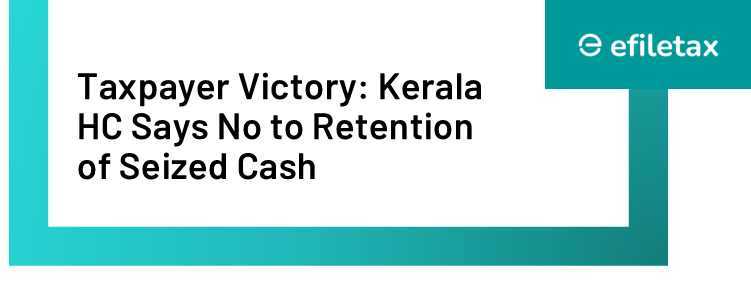
Kerala High Court Rules Against Retention of Seized Cash by GST & IT Departments
The Kerala High Court, in a significant ruling, has held that seized cash cannot be retained by either the Goods and Services Tax (GST) Department or the Income Tax (IT) Department before the conclusion of legal proceedings. The decision was made by a Division Bench comprising Justices A.K. Jyasankaran Nambiar and Easwaran S., who ruled that illegally seized cash cannot be handed over to the IT Department under Section 132A of the Income Tax Act.
Case Background: Illegal Cash Seizure Under GST Laws
- The case originated when the GST Department of the State seized cash from an assessee’s premises under Section 74 of the CGST/SGST Act.
- The seized cash was subsequently handed over to the Income Tax Department, citing a requisition issued under Section 132A of the Income Tax Act.
- The assessee challenged the seizure and retention of their funds, arguing that cash does not qualify as stock-in-trade under GST laws and hence, cannot be seized by GST officers.
Court’s Observations and Ruling
- No Legal Authority for GST Department to Seize Cash
- The court clarified that GST authorities do not have jurisdiction to seize cash unless it forms part of the taxpayer’s stock-in-trade.
- Retaining seized cash without final adjudication is illegal and a violation of taxpayer rights.
- Handing Over to IT Department is Not Justifiable
- The court held that the mere act of transferring the seized amount to the IT Department does not validate an otherwise unlawful seizure.
- Even if the IT Department acted under Section 132A of the IT Act, the initial seizure must be legal for further retention to be lawful.
- Violation of Due Process
- The bench emphasized that due process must be followed when seizing and retaining assets.
- The Single Judge had earlier directed the assessee to approach the IT Department for the release of the cash. However, the Division Bench overturned this, ruling in favor of the taxpayer.
Legal Precedents Supporting the Ruling
- CBI v. V.C. Shukla (1998) – Stressed the importance of lawful seizure and handling of assets.
- Radha Krishan Industries v. State of HP (2021) – Highlighted the need for tax authorities to act within their jurisdiction.
- Khem Chand v. Union of India (2019) – Clarified that retention of seized property without legal backing violates fundamental rights.
Implications of the Ruling for Taxpayers
For Business Owners & Service Providers:
✅ Enhanced protection against unlawful seizures by tax authorities.
✅ Clarity on jurisdictional limits of the GST and IT Departments.
✅ Faster redressal of wrongful asset retention under tax laws.
For Legal & Financial Professionals:
📌 This judgment strengthens legal arguments against arbitrary tax department actions.
📌 Serves as a reference case for challenging illegal cash seizures.
📌 Helps tax consultants ensure compliance with seizure provisions under GST & IT laws.
Final Thoughts
The Kerala High Court’s judgment is a big win for taxpayer rights, reinforcing that seized cash cannot be retained indefinitely without a final order. Taxpayers, businesses, and financial professionals should be aware of this ruling to ensure their rights are protected against unlawful asset seizures.